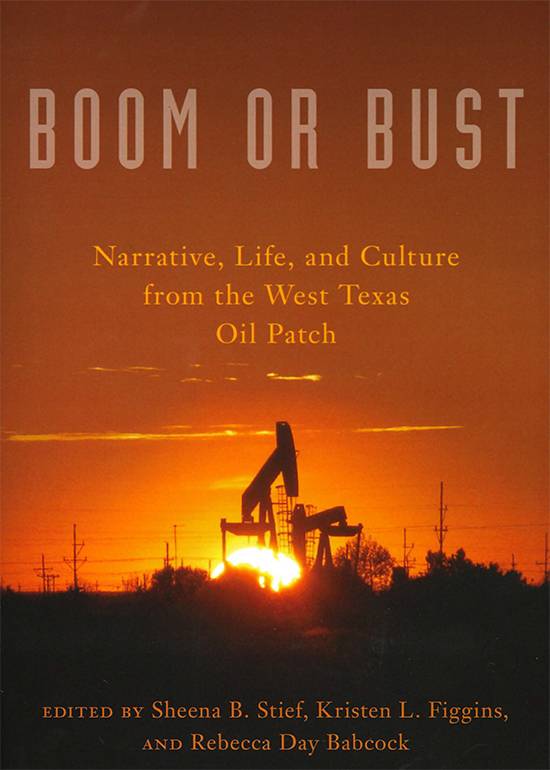
Boom or Bust: Narrative, Life, and Culture from the West Texas Oil Patch
Edited by Sheena B. Stief, Kristen L. Figgins, and Rebecca Day Babcock
Norman: University of Oklahoma Press, 2021.
220 pp, $22.00 paperback.
Reviewed by
Jonna Sharp
“Boom or Bust is hard to criticize as a whole...the editors accomplished their goal: to bridge the literary gap between the sciences and the humanities concerning the West Texas Oil Patch.”
Boom or Bust: Narrative, Life, and Culture from the West Texas Oil Patch aims to put a spotlight on those who have lived through the boom-and-bust cycles of oilfield life in the Permian Basin region of West Texas. If you skip to Part II: “The Narratives,” that is what you get. Part II gives a voice to those who otherwise may never be able to share their story. Titled “Writing West Texas: A Note on the Boom-or-Bust Writing Workshops,” Part II offers an attractive description of both the narratives and the writing workshops that precede them. Statements such as “each of the writers in the workshops, however, brought to the project a willingness to represent their sense of place and what they have come to know about the Permian Basin” leave the reader wanting more. Part II, The Narratives has it all: perspectives from locals, oilfield wives, an engineer, and an academic. It is arguably the best part of the book.
Sadly, the writers in Part I almost ruin the experience for the reader. At times, it’s hard to tell whether they disapprove of oilfield life, or if they are just not good at remaining impartial. Phrases like “hastily erected,” used to describe the way school buildings and houses were built, suggest the former. The writers in Part I also make it clear, whether intentional or not, that they don’t have a high opinion of oilfield workers. Terms such as “victimless crime” are used a handful of times, as in “victimless crime was, and is, an oil boom reality.” Overall, the writers don’t show much respect for the working class.
As an anthology with many subtopics within each section, Boom or Bust has a lot going on. It touches on many parts of oilfield culture: the linguistics, the homelife, and its overall impact on communities. Perhaps it has too much going on. There is a short chapter titled “What Energy Humanities Is and Why It Matters,” which comes in at an odd place. Hitting the reader early on with a chapter heavily dedicated to the harmfulness of greenhouse gases smells like propaganda. It is difficult to reiterate what the chapter is about, other than the dangers of what its writers call “the dominance of fossil fuels.” While the topic of energy humanities is perhaps an important discussion to have, it does not fit well next to the other chapters.
At the beginning of “Part III: The View from the Arts” Kristen L. Figgins, one of the book’s editors, comes out swinging with her criticism of several examples of petrofiction, or oil fiction, in “Crude: The Unrefined Communities and Landscapes of Petrofiction.” Figgins picks apart the narratives of Oil! by Upton Sinclair, describing the main character, J. Arnold Ross, as a “powerful” wildcatter out to take advantage of unsuspecting, struggling landowners. Figgins says “they all do a remarkably consistent job of portraying the petrofolk in a way that stains them with the crudeness as the oil that shapes their lives” about authors of petrofiction. If it wasn’t already clear that Figgins is passionate about humanizing the people in oil communities, she closes out the chapter with the following statement: “It is important that the people and landscapes affected most by oil are not exoticized, otherized, or victimized in the narratives about them. It is also important that they are not universalized as hillbillies, rednecks, or country folk, as they often are in all three of these narratives.”
Boom or Bust is hard to criticize as a whole. The emotion and honesty found in Part III may come a little too late, the topic of energy humanities in Part I is out of place, and The Narratives in part II may be more comfortable in their own paperback, but the editors accomplished their goal: to bridge the literary gap between the sciences and the humanities concerning the West Texas Oil Patch.
Jonna Sharp is a student in the Master of Arts in Technical Communication program at Texas State University.
